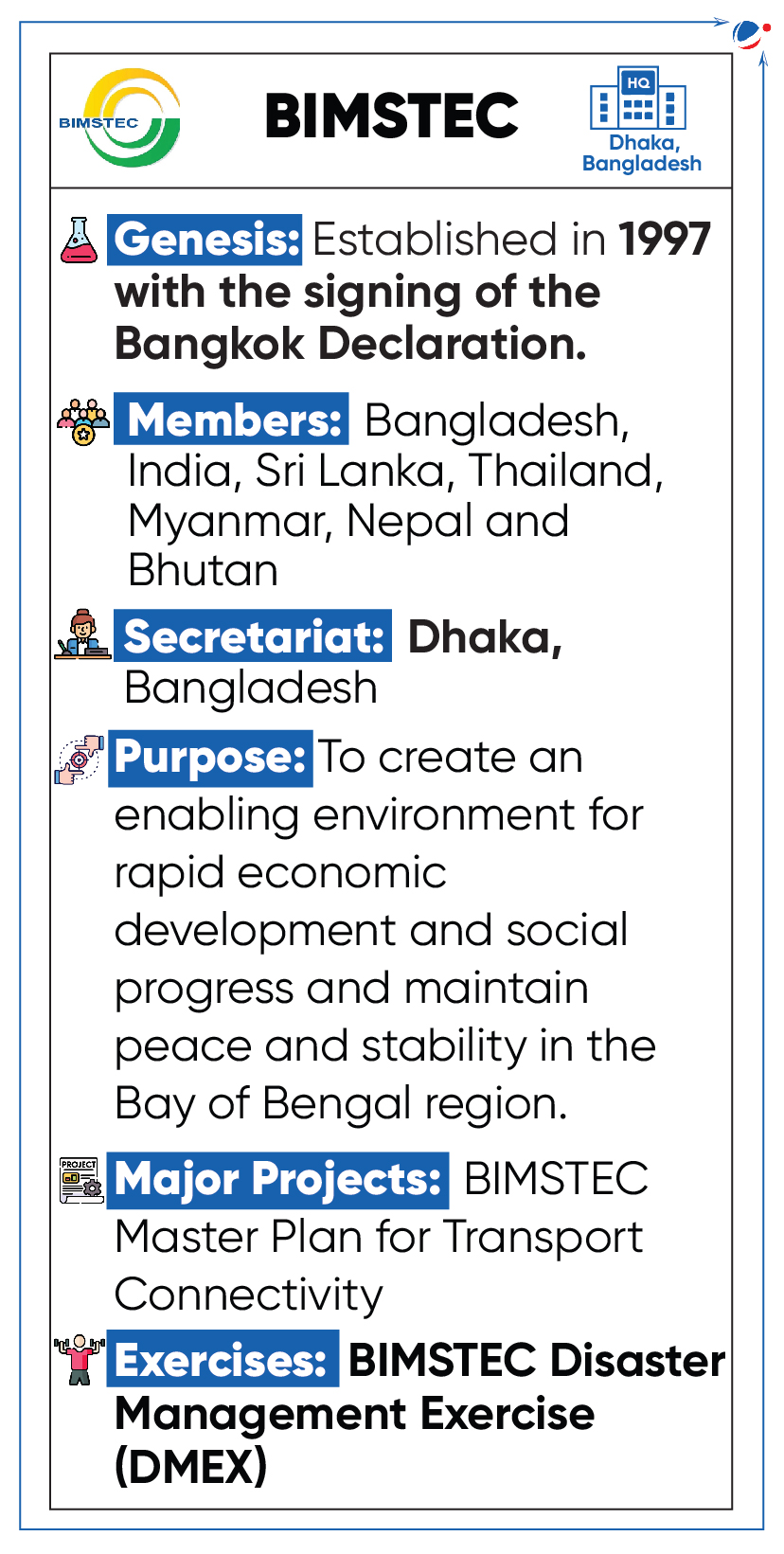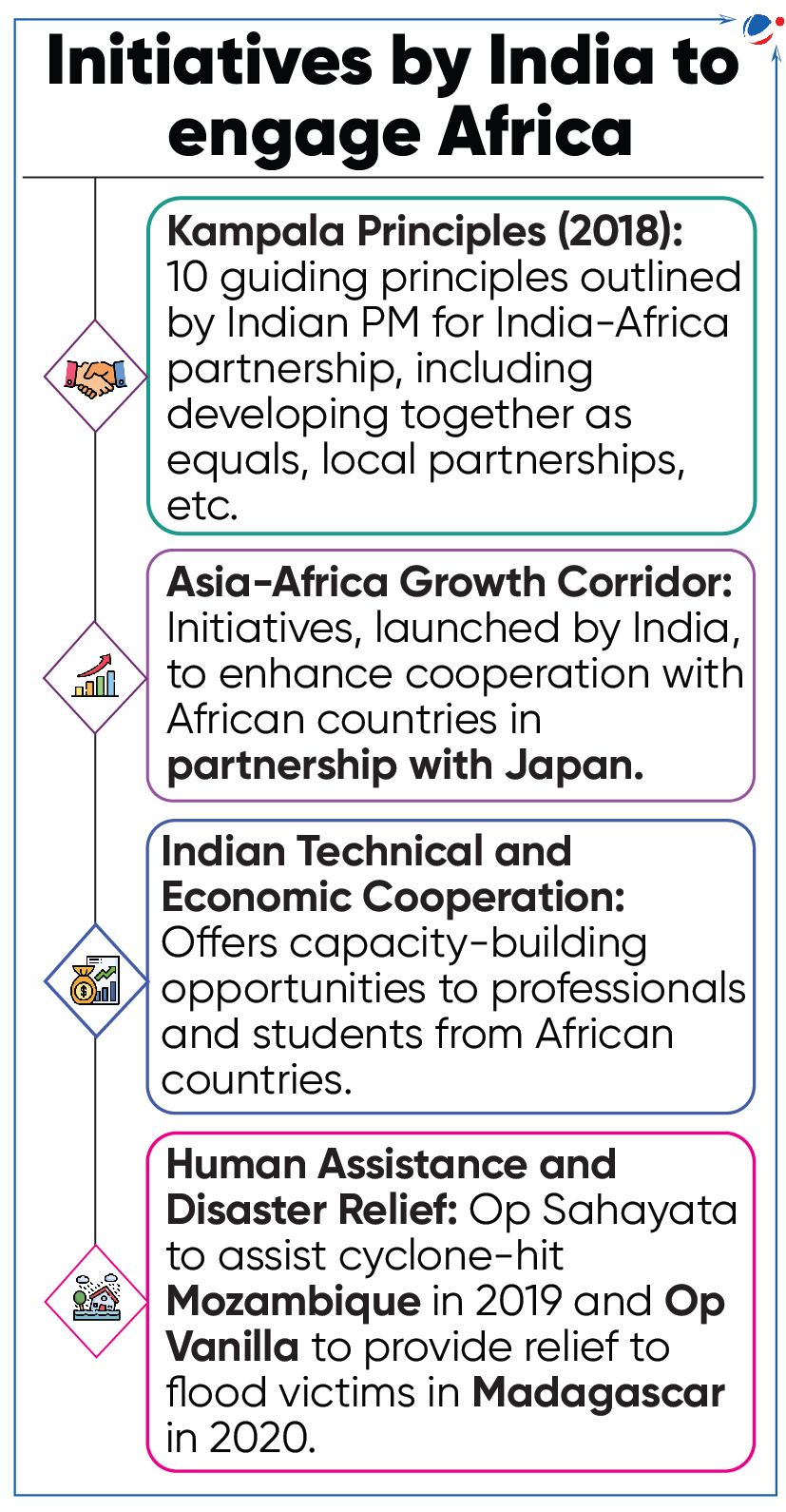The Bay of Bengal Initiative for Multi-Sectoral Technical and Economic Cooperation (BIMSTEC) charter was signed and adopted during the 5th summit of the grouping in Sri Lanka, in 2022.
- With the endorsement of the charter by Nepal, all member states completed the ratification of the foundational document and the charter came into force on May 20, 2024.

About BIMSTEC Charter
- BIMSTEC Charter is a foundational document that outlines the goals, principles, and structure of the BIMSTEC.
- Charter confers legal personality on the grouping and paves the way for external partnerships and admission of observers and new members.
Significance for India
- Give boost to India’s Act East and Neighbourhood First policy.
- It acts as a bridge between South Asia and SouthEast Asia.
- BIMSTEC would provide an alternative platform especially after dysfunction of SAARC since 2016.
Challenges:
- Slow Organizational progress: The charter enforced after 27 years of formation.
- Absence of a Free Trade Agreement among BIMSTEC members: Members involved in bilateral, multilateral trade with non-members.
- Strained relations between members: Bangladesh-Myanmar relations over the Rohingya refugee crisis, the India-Nepal border issue, etc.
Dialogue aims to share ideas and explore ways to develop institutional, technical and bilateral synergies to work together in Africa.
- This is the first such dialogue on Africa between India and the US after the inclusion of the African Union as a permanent member of the G20 during India’s presidency of the G20.

Significance of Africa for India
- Strategic: Africa is vital for India’s maritime security, protect trade in the Indian Ocean Region from piracy, etc.
- Economic: Africa's vast natural resources, including oil, gas, minerals, etc., and growing market provide both demand-side and supply-side opportunities for the Indian businesses.
- Energy Security: Collaboration in the renewable energy sector, such as under International Solar Alliance, aligns with shared goals of sustainable development.
- Multilateral: Cooperation with African countries in multilateral forums like UN, Commonwealth, and Non-Aligned Movement enhances India's global influence and prospects of South-South cooperation.
Challenges in India-Africa Relations
- China factor: China's growing influence in Africa through its Belt and Road Initiative (BRI) and investments poses a challenge to India's interests.
- Security: Persistent conflicts and political instability in parts of Africa pose risks to Indian investments, expatriates, and development projects.
- Racial tensions: African students complain of harassment and discrimination.
India celebrated its ‘Telecom Diplomacy’ on World Telecommunication and Information Society Day.
- Telecom Diplomacy has helped attract new business ventures, forge partnerships, and demonstrate India's commitment to secure its leadership position in the global telecommunications landscape.
Steps taken for Telecom Diplomacy
- Strategic Partnerships with partner countries and Telecom chip companies: 'US-India OpenRadio Access (ORAN) Network Acceleration Roadmap’.
- Exchange of Best Practices: India-USA collaboration facilitated dialogue on international best practices in spectrum allocation, quality of service assurance, etc.
- The DoT explored potential collaborations to elevate R&D, foster innovation, and fortify the startup ecosystem in Quantum Communications within India.
- Transforming India Mobile Congress (IMC): Significant efforts were undertaken to make IMC a global event like Mobile World Congress by 2025.
Achievements of Telecom Diplomacy
- Indian companies have exported Rs 25200 crores worth of telecom equipment and accessories 2023-24.
- Securing Indian Interests and leadership positions in international forums
- India's active participation at the World Radio Conference (WRC) resulted in safeguarding spectrum for Indian operations in airspace and sea and enabling future 5G deployments.
- The World Telecommunication Standardization Assembly (WTSA) will be held for the first time in India (October 2024, New Delhi) to decide the future direction of standards for the next generation of telecommunication systems.
Malaysia is aiming to improve its environmental image by putting forward “orangutan diplomacy”, a type of Animal diplomacy.
About Animal Diplomacy
- Involves giving or lending animals as a sign of friendship or goodwill between countries.
- These creatures possess cultural significance or are indigenous to the country that gifts them.
- Considered as an element of soft power.
- Key Examples: China’s panda diplomacy; Australia’s koala diplomacy, etc.
- Ethical Concern: Animals are being used as a means (considering them as an object) to fulfil interest of Nations.
Philippines denied China’s claim on agreement over disputed South China Sea’s Second Thomas Shoal.
- South China Sea is a part of western Pacific Ocean stretching roughly from Singapore and the Strait of Malacca in the southwest, to the Strait of Taiwan in the northeast.
- Key Disputes in the South-China Sea: Nine-dash line (imaginary line) of China which covers most of the South China Sea and overlaps with the exclusive economic zone claims of Brunei, Indonesia, Malaysia, the Philippines, Taiwan, and Vietnam. It includes
- Paracel Islands: Controlled by China but also claimed by Taiwan and Vietnam.
- Spratly Islands: Claimed by China, Taiwan, Vietnam, Philippines, and Malaysia.
- Second Thomas Shoal, a submerged reef is located near this Island.
- Scarborough Shoal: Claimed by China, Taiwan, and Philippines.
Middle powers, lacking a universally agreed-upon definition, typically rank below great powers but exert influence over global politics.
- Great powers are countries with a permanent seat on the United Nations Security Council.
- Middle powers have extensive diplomatic, economic, multilateral, and military heft.
- They comprise:
- Global North countries like Australia, Canada and South Korea.
- Global South nations like India, Argentina, Brazil and Indonesia.
- Significance: Strengthen multilateralism; represent the voice of the global south, etc.
Political scientist Ian Bremmer defines a geopolitical recession as a situation where established global power frameworks are crumbling.
- According to him, like economic recession, Geopolitics have boom and bust cycles, too.
- During geopolitical recession, responding to a crisis becomes significantly more challenging due to the decreased resilience of political institutions.
- Reasons for current geopolitical recession
- Long-term rise of China and the Global South, combined with a decline of European and Japanese economic power.
- Tensions over trade between the US and China.








